Planet Mellotron Album Reviews: Rick Wakeman (original) (raw)
 |
 |
 |
|---|---|---|
 |
||
 |
||
 |
 |

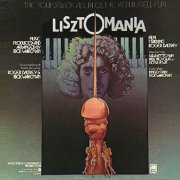 |
Lisztomania [OST] (1975, 32.51) ***½/TTT½ |
|---|---|
| Rienzi/Chopsticks FantasiaLove's DreamDante PeriodOrpheus SongHellHibernationExcelsior SongMaster Race | Rape, Pillage & ClapFuneraillesFree SongPeace at Last |
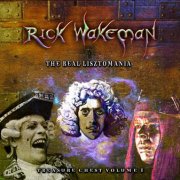 |
Treasure Chest Volume 1: The Real Lizstomania (2002, recorded 1975, 46.28) ***½/TTT | |
|---|---|---|
| The SceneThe MetronomeThe Country Sword DanceFree SongThe Freudian DreamDante PeriodOrpheus SongFor the Chop | HellWagner's DreamThe Dream of HellThe Inferno RideMaster RaceThe Ride of ThorExcelsior SongThe Guardian Virgins | Rage, Pillage and ClapLove's DreamThe SufferingPeace at LastLove's Dream |
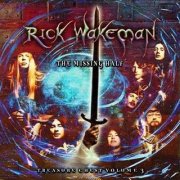 |
Treasure Chest Volume 3: The Missing Half (2002, recorded 1974, 52.57) ***½/TTT |
|---|---|
| Catherine ParrA Road to RuinCatherine HowardAnne BoleynTwelfth Street RagThe Pearl and Dean Piano Concerto | The David Hemmings Voice Collection: a) Camp b) West Indian c) Irish d) South London e) WelshKing ArthurGuinevere |
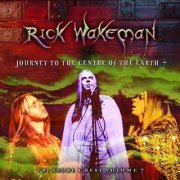 |
Treasure Chest Volume 7: Journey to the Centre of the Earth + (2002, recorded 1974, 65.49) ***/TTJourney to the Centre of the EarthCatherine ParrCatherine HowardAnne BoleynThe American Advert Concerto |
|---|
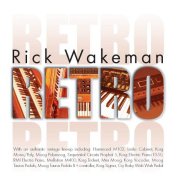 |
Retro (2006, 69.02) ***½/TTTT |
|---|---|
| Just Another DayMr. LonelyOne in the EyeMen in SuitsLeave the BlindfoldWaveformRetrospectiveHomage to the Doctor | Can You Smell Burning?The Stalker |
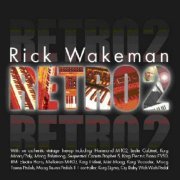 |
Retro 2 (2007, 63.36) ***/TTT½ |
|---|---|
| Chasing the DevilExpect the UnexpectedBeyond the VoidAn Angel Spoke to MeThe SoundtrackThe Fairground ShuffleRobert the RobotStanding Room Only | Tigger the BounceThe Temple of Life |
Current availability:
- Six/Journey/Myths: A&M
- Lisztomania/No Earthly/White/Criminal: A&M (Japan)
- Test: Windsong (UK)
- In Concert: King Biscuit (US)
- Retro 1 & 2: President (UK)
I'm reliably informed that some of Rick's more recent albums are available from:
- The Store for Music (UK)
Mellotrons/Birotrons used:
- Six Wives - White Rock/Test/In Concert: two or three of Rick's own M400s
- Criminal: one or more of Rick's own B90s
- Retro 1 & 2: Lee Pomeroy's M400
Rick Wakeman had been playing in bands since the mid-'60s, but his first encounter with the mighty Mellotron had to wait until 1969, when he was at music college, moonlighting as a session musician. He was hired to play Mellotron on a track, Space Oddity, by an almost unknown artist, a certain David Bowie. It was a huge hit, although oddly its creator had to wait another couple of years before his career really took off. For what it's worth, Space Oddity is on the 'famous Mellotron songs b-list', quoted less often than Strawberry Fields Forever, Nights In White Satin and (erroneously) Stairway To Heaven. According to Wakeman, he was originally asked to double the string section part, but they liked the sound of the Mellotron so much that he was instructed to double-track it throughout the song. By 1970, Wakeman had quit (or been ejected from) college and had joined The Strawbs as they moved from their original folk leanings towards a more symphonic direction. His second and final album with them, From the Witchwood, featured Mellotron on just one track, although the band, with various other keyboard players, became staunch Mellotron supporters over the next few years.
In 1971, Wakeman was lured from the Strawbs to join Yes, by then approaching their musical peak. Being more amenable to a multi-keyboard setup than his predecessor, Tony Kaye, he was bought a MiniMoog and an M400 to add to his trusty Hammond C3. Now, I know Rick Wakeman is one of prog's sacred cows (moo for me, Rick), but after trawling through all his solo albums, I've come to the conclusion that most of his work is fairly dismal. Sorry, but his compositional talents really aren't up to that of his (on and off) colleagues in Yes, which is probably why he's got so few writing credits in their catalogue (although I have read that publishing issues were involved). Now, this is not to be taken as any sort of criticism of Rick's playing; he's a fantastic player, I just don't think he writes very well, although his first solo album proper The Six Wives of Henry VIII is easily the best of the bunch. In fact, I'd go as far as to say that it's a damn' good album, despite its tres pretentious subject matter (1973, OK?); instrumental keyboard-based progressive, with reasonably good composition and a whole slew of great keys work, including gen-u-wine church organ on Jane Seymour. I have to say that with one or two exceptions, the pieces don't really appear to reflect their subjects' characters, apart from the sombre Catherine Howard, one of the two poor women put to death by the monomaniacal king. The Mellotron use throughout is good, if not outstanding; mostly strings, with the odd bit of choir thrown in for good measure and allegedy Mellotron Moogs at one point. The ensemble playing is excellent; shame Rick's quality control lapsed so badly later on. Blame the booze; he does...
A brilliant story concerning Six Wives comes from The Sound Projector magazine, issue 9. Gareth Williams from influential experimental rock trio This Heat used to own a record shop in Leicester Square:
"A&M had an offer where, if you shipped enough copies of The Six Wives of Henry VIII by Rick Wakeman, you'd get a colour TV! So Gareth ordered hundreds and hundreds of copies and subsequently got himself a TV. And then he would have sessions downstairs in the cellar where he and other work-people and friends of his would come along and he'd roll up a few as it were and they would proceed to deface and smash and generally destroy these aforementioned records. Of which there were thousands! Then he'd phone up A&M and say "Sorry! That batch you sent me, they're all scratched!" and then "Actually, I don't really want them. Can you send me Kohntarkozs by Magma?" So all the copies of that Magma record must have come from his shop."
This story would be even funnier had it involved one of Rick's next several projects...

Rick left Yes for the first time of many around this time, giving him the freedom to immerse himself totally in his solo career. Oh dear. For his next project he decided to go totally over the top and tackle Jules Verne's Journey to the Centre of the Earth musically. OK... Six Wives worked well enough, so why not? Because Six Wives was fully instrumental and played by a small ensemble, whereas Journey had a full orchestra, choir and narrator and was recorded live. The music's pretty terrible, too; Rick had by this point shifted into 'Broadway show' mode and the themes become cheesier and cheesier as the album progresses. The narration is pretty ridiculous, only serving to interrupt what little flow there is. Journey actually introduced the world to the precocious vocal talents of 'bellowing' Ashley Holt, one of Rick's old pub band mates and by God, it shows. This man should never have been allowed anywhere near a mic, let alone used on many of Rick's albums; he consistently sings flat and what vocal tone he has is pompous and overblown. Apart from that, he's fine.
The album's original sleeve has a nice eight-page insert featuring photos of various objects presumably meant to convey some sense of plot, including a close-up of somebody's ear with Rick's disembodied head about to disappear into it, a field of mushrooms with the narrator superimposed in the middle, sitting in one of those high-backed cane chairs that were popular at the time and, best of all, two terrapins swimming in what looks suspiciously like beer. Very appropriate, since this album bears all the hallmarks of something that seemed like a good idea after a night down the boozer, only for Rick to find when his hangover wore off that he'd already signed a contract. Or recorded the album. Now, the picture on the sleeve has Rick plus rig surrounded by orchestra and band and while his custom 'double-Mellotron' is plainly visible, I have to say that it's basically inaudible, especially given that it probably couldn't produce any sound not already covered by the orchestra and choir. Various people have told me they can hear bits of it, so there may be some vibes somewhere and possibly a descending string run in The Forest. Please tell me if you can spot exactly where, 'cos I can't... Incidentally the 'double Tron' (now residing in the States) has recently been fully restored from an unplayable piece of junk to 'good as new'.
Myths and Legends... is another of Rick's ridiculous 'concept' pieces, this time recorded in the studio, although it was infamously performed live on ice. Apparently, Wembley's Empire Pool (later the Arena) had been iced over for some long-running event, probably 'Holiday on Ice' (yes, this is considered entertainment in the UK) and it would've cost too much to thaw and re-freeze it just for Rick's gigs, so he got in a bunch of professional skaters and did it that way. Priceless. One of his own stories concerns the performance where one of the 'knights' went off sick, leaving an odd number. Of course, at the end of the carefully choreographed battle scene, one knight was left skating around disconsolately, having not been killed, before finally, in despair, falling on his own lance to tumultuous applause and hysteria from the crowd. Oh to've been there...
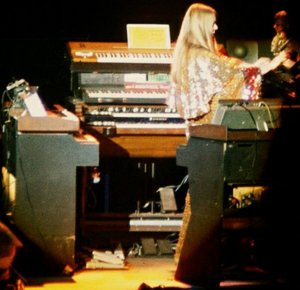 |
|---|
| Rick with his solo career setup, c.1975, black double M400to his left and black regular one on legs (!) to the front |
Anyway, the album: like its predecessor, it sounds more like a b-movie soundtrack, or possibly a superior version of Lloyd-Webber's Broadway shows (I couldn't condemn anything to inferior status...), although it's marginally better than Journey. The composition is, er, somewhat plodding, as is much of the ensemble playing and the singing is actually flat in places. Rick's playing is top-notch, as usual; it's just a shame he didn't have any better material on which to exercise it. To the Mellotron: Guinevere has some reasonable strings and choir, despite there being a full orchestra and choir on the record anyway. The fairly dreadful Merlin The Magician, complete with awful honky-tonk piano/duelling banjos section (I kid you not), has some strings and flutes, but if you think this is bad, you ain't seen nothing yet...
Still in full-on excess mode, later that year Rick accepted a commission from lunatic film director Ken Russell to produce the soundtrack for his latest piece of madness, Lisztomania. I've never seen the film, although I remember seeing a highly intriguing cinema preview for it at the time and going by the stills on the rear sleeve of the album, it certainly looks worth seeing, especially if you liked Russell's previous effort, The Who's Tommy. The soundtrack is composed almost entirely of music by Liszt and Wagner, played mostly by Rick and is as endearingly bonkers as you might expect. The vocal tracks, mostly sung by the film's star, Roger Daltrey, are fairly painful, but the instrumental stuff's actually pretty good, although it has the advantage of being written by 'proper' composers. The opening track, a bizarre hybrid of a 'regular' classical piece and learner's favourite Chopsticks and a couple of pieces towards the end of the album feature real strings, but most of the other tracks have Rick's Mellotrons splattered all over them (largely strings), played with his usual panache, particularly on the excellent Hell. Lisztomania doesn't crop up very often, although I believe a different version of the soundtrack was included as part of an eight-CD set released early in 2002.
His next regular release, No Earthly Connection, was a return to a more 'normal' format, although there is supposed to be some sort of concept to the album. Now, the first fifteen or twenty seconds are great. I love the first fifteen or twenty seconds. An excellent multi-overdubbed 'MiniMoog section', with notes swooping up and down the scale, resolving into a huge chord at the end. Unfortunately, the remaining 41½ minutes or so are unutterably turgid rubbish, complete with all the things with which Rick spoils his albums; poor composition, ridiculous lyrics, terrible singing, flowery, over-mannered playing... I think you probably get the picture by now. Of course, with his famed sense of humour, you're never entirely certain just how seriously you're supposed to take all this, but I suspect that there's rather less irony than you'd wish, i.e. none. On the plus side, No Earthly Connection has Mellotron on practically every track, although often used sparingly. Shame, really; a bit more may've covered up some of the album's deficiencies. Oh and Rick's site details an unsavoury story about the running water sounds on the album, which were apparently produced by the entire band urinating into a metal bathtub after a night on the piss, er, so to speak. Lovely.
Rick was back in Yes by this time, for the first of his many re-joinings, recording 1977's Going for the One and '78's Tormato, plus the posthumous live Yesshows, although he still found time for his solo career. White Rock is basically instrumental music written for a film of the 1976 Winter Olympics and although I've never seen it, it probably works quite well in that context. The material is, while not actually classic, a vast improvement on No Earthly Connection and there's still plenty of Mellotron in evidence, though this would be Rick's last actual Mellotron solo album. Much string and flute to be heard here, especially on The Shoot and Lax'x. Actually, I feel impelled to give this four stars. If only Rick had learned from it...
Rick Wakeman's Criminal Record. Well, say no more, really. I think No Earthly Connection would suffice as incontrovertible evidence that Rick is far, far better as a sideman than a band leader. Guilty as charged, m'lud. I shall now sentence you to endlessly repeat yourself, releasing awful album after awful album, all played on the cheesiest of Korg synths... Hang on, you already have... Er, sorry - I seem to've got slightly carried away there; my Rick (as against Richard) Hell fantasy can be a little vivid sometimes... Shit, this is really unfair; people I know who've met him say what a lovely bloke he is [n.b. I now have myself and he is]. I just wish he'd put out something decent and stop using those appalling synth sounds! Well, at the time of writing he's just rejoined Yes for the fifth, yes, that's the FIFTH time, so at least we'll hear him play some classic material in the not too distant future.
Er, I was reviewing the album, wasn't I? Well, it follows on from White Rock in that it's instrumental and largely keyboard-based and not actually bad at all. The album is notable for being one of the few to feature Rick's then-current project, the Birotron. The idea of a loop Mellotron had merit, but the execution was hopeless and it sounded like nothing so much as, er, a murky, badly adjusted Mellotron with dirt-encrusted heads, but without any attack portion to the sounds. OK in the mix, but apparently horrible played solo. You can hear it on three tracks here, but it's really no match for its far more illustrious predecessor. So, an OK album, but get White Rock first, or better still, Six Wives. At least there's no Ashley Holt...
Although Rick's Mellotrons were long, long gone by the '90s (literally, in the case of two of them), two archive live CDs were released within a year of each other, dating from the mid-'70s. Live on the Test is a transcription of the radio broadcast of a concert partially televised on the BBC's The Old Grey Whistle Test in April '76 and gives a good idea of how Wakeman's English Rock Ensemble sounded live. Despite the presence of the rotund yet strangely flat Ashley Holt again, the band were pretty good and despite too many tracks from his current release, ohnoit'sNoEarthlyConnectionagain (particularly the godawful The Prisoner), it's a good album, with some great playing from (almost) all concerned. Rick's between-song banter hasn't dated too well, ditto his band's sense of humour, but there's a reasonable amount of Mellotron to be heard, though oddly not on one new song that has it on the studio version. Some tracks, e.g. Recollection from Journey only have short bursts, but others, including Catherine Parr make up for it with a brass part - Wakeman would have been using two Mellotrons on the night. It has to be said that the band sound like they're having fun, which is more than you can say for many bands, particularly in the prog field.
In Concert, released a year later, is actually a US King Biscuit Flower Hour recording from '75, so at least we avoid any bloody No Earthly Connection material this time round. The downside is nearly half of Journey, but it does make more sense played by a band sans orchestra/choir, to be honest. The band stretch out on a few tracks, in a rather un-proglike style, including a lengthy acoustic guitar solo spot in Catherine Howard. Possibly slightly more Mellotron than on Live on the Test, with some excellent parts you won't hear on the studio versions. The chief problem with both these albums is the recording; Rick's MiniMoog is too high in the mix on both, there's a little distortion on Live on the Test and some volume fluctuations on In Concert, but that's probably the nature of radio broadcast transcriptions, often mixed to stereo on the spot. Both albums are worth the effort above much of Rick's studio output, in my humble opinion, partly for their excellent ensemble sound and partly for their choice of material, trimming much of the dead wood from his back catalogue.
In 2002, Rick unearthed a pile of old tapes, issuing them as the sprawling, eight-disc Treasure Chest, volumes 1-7 of which were quickly made available separately. Three of the eight concern us here, starting with Volume 1: The Real Lizstomania, Rick's original vision for the soundtrack, before the record company did what record companies do and mangled it. Whether it's actually better than the released version or not is for you to decide, I think; both versions work well to my ears, although with an extra fourteen minutes of music, this version has to win out on grounds of bulk. There don't appear to be any new Mellotron tracks, with strings on Orpheus Song, Hell, Master Race, The Ride Of Thor, Excelsior Song and probably Rage, Pillage And Clap, although the orchestral backing on Love's Dream is real. Master Race is the only track I haven't highlighted on the original album, but it's an under-a-minute piece with the Mellotron only audible for a few seconds at the end, so I wouldn't get too excited about it if I were you.
Volume 3: The Missing Half is the half of the Journey concert that (obviously) wasn't released at the time plus some other bits. The three live Six Wives pieces all work well, with Rick's usual humour at work on A Road To Ruin and The Pearl And Dean Piano Concerto. The David Hemmings Voice Collection is Journey narrator Hemmings working through a few of his accents in the studio, for better or worse, while the two Myths & Legends tracks at the end appear to be early mixes of the studio versions. Mellotronically speaking, there's choirs on Catherine Parr (not sure how he does that live while playing piano two-handed, but there you go), ditto the strings and flutes on Catherine Howard and Anne Boleyn, plus brass on the latter. Twelfth Street Rag rather improbably opens with a full-on brass part under Rick's MiniMoog, before the rather ubiquitous ragtime piano enters stage left and the two Myths & Legends pieces have their usual parts present and correct. So; did Rick have a second keyboard player in his ensemble? No-one's credited, but unless the left-hand piano parts are covered by the bass while Rick plays Mellotron with his left hand, or one of the singers adds some during down-time, I really don't see how he could do this.
Volume 7: Journey to the Centre of the Earth + seems to be a straight reissue of a bootleg from around 1974, containing a complete touring performance of the title piece (which really is pretty terrible, I'm afraid), plus three Six Wives selections and the jokey American Advert Concerto, the humour of which is largely lost on a Brit three-and-a-half decades later. On the Mellotron front, there's a major string part on Journey itself, inaudible on the original version, mixed Mellotron and real voices on Catherine Parr, very upfront strings and flutes on Catherine Howard and flutes and brass on Anne Boleyn, all nicely high in the mix.
Late 2005 brought a shock announcement from the Rick camp: while having his possessions packed for a move back to the mainland from the Isle of Man after his latest divorce, many of his old keyboards were unearthed (obviously no Mellotron) and Rick made the decision to make an album using these and these only. Come 2006 and Retro is, while no classic, the best Rick Wakeman album since, well, White Rock. It has its regrettable moments, not least using Bellowing Ashley again (WHY does Rick think he's any good?), a truly awful song in Leave The Blindfold, with its plinky-plonky PolyMoog and a little too much cheesiness in some of the other pieces, but a good deal of the material is as good as anything he's written since Six Wives. Er, how come? Surely simply digging out some decent gear isn't going to improve his writing? Maybe it has.
Luckily for us all, Rick's bassist, Lee Pomeroy, is a proud M400 owner and Rick sticks it all over the album, along with a range of very cool stuff, including the aforementioned PolyMoog (possibly a little too much), a Prophet V, MiniMoog, Korg Mono/Poly, RMI Electrapiano and many others. Highlights on the Mellotron front include Rick's trademark string swells in One In The Eye and a cool pitchbent part in Men In Suits, but there isn't an unwelcome Mellotron part here, to be honest, with plenty of flute, brass and choir parts, too. Rick has said this is a one-off, which is a real shame, as not only is the album the best-sounding thing he's produced in decades, but using this gear seems to have inspired his writing and arranging skills and to slip back to digital tedium would be a terrible waste. Mind you, much of the (Mellotron aside, completely unmaintained) gear was apparently a nightmare to work with; now there's a surprise. One criticism I have to make, though, is the sleeve: I know the whole point of the album is its gear list, but to put it on the front of the CD looks a bit tacky, although the 'Retro' lettering with close-up shots of some of the equipment used is quite amusing.
Well, after Rick swore blind that Retro was a one-off (yeah, right), 2007 brought Retro 2, as, I suspect, its predecessor was his best-selling album for years. To be honest, the compositional quality here doesn't match the previous year's effort, but then, it's a lot of new material to spew out in short order, I suppose. Overall, the instrumental tracks work better than the vocal ones (where have we heard this before?), so while we're spared Bellowing Ashley (at last! At last!), Rick's daughter Jemma, while possessing a lovely voice, is also a bit MOR, I'm afraid and the songs on which she sings seem to be infused with a certain Light Entertainment feel. There's some great instrumental work herein, though, with the ridiculously-named Tigger The Bounce being a beautiful piano piece and most tracks featuring ripping synth and/or Hammond work from the fingers of the mighty Mr W. Once again, helpfully, Rick's put full instrumental credits in the booklet, although you don't need any credits to hear the choirs in Chasing The Devil or the flutes in The Soundtrack, not to mention the various strings, brass and cellos that work their way in, too. So; not so great on the composition front, but some lovely Mellotron work.
By now, many of you will be thinking, "That's a bit bloody harsh, innit?". I'm not just being nasty for the sake of it (although that's not unheard of); much of Rick's solo output greatly disappointed me by not even coming close to what he achieved in Yes; most of the albums listed above have their moments, but on some of them they're somewhat few and far between. There's a reasonable amount of Mellotron to be heard on most of them, which is some slight compensation for the dodginess of much of the material. Of course, Rick's still churning them out to this day, but I wouldn't personally touch anything after Criminal Record (with the obvious exception of the Retro albums) with a bargepole. Rick was always a bit of a raconteur live and these days makes a better living as a TV personality than he does as a musician and I have to say that his gigs are more 'stand-up comic who plays keyboards' than vice versa. In the words of one of his own stories, after playing piano at someone's wedding reception, he was approached by someone who told him that he was 'really rather good' and should maybe think about 'taking it up professionally'.
So, for what it's worth, my recommendations: Six Wives, White Rock, Retro and both archive live releases. Criminal Record's OK, but approach the other three with caution (extreme caution in the case of you-know-what...) and don't touch anything later. The best material from Journey and Myths and Legends... is on the live CDs, anyway and you won't have the embarrassment of people seeing them on your shelves.
p.s. For those interested in hearing the Birotron and who can't be bothered to trawl all through the list, try two Yes albums, one Wakeman solo, three by US/German electronic outfit Earthstar and one recent release by Eleni Mandell.

The Six Wives of Henry VIII: Live at Hampton Court Palace (2009, 79.36) ***
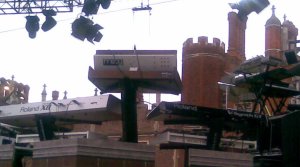 |
|---|
| photo: Mark Rae |
I'm sure you all know that Rick decided to play Six Wives live at Hampton Court Palace in spring 2009, honouring Henry VIII's favourite dwelling. I didn't attend, but am told it was pretty much the kind of spectacle you'd expect, complete with ridiculous mock battlements (bottom of pic, right) and a dose of typical Rick humour. Due to original album's relative brevity (well, there were only six wives, after all), Rick composed another three pieces especially for the occasion, an intro, Tudorture/1485, an outro, Tudorock and the best of the three, Defender Of The Faith, although none match any of the main event. Saying that, none of the original six tracks sound that great here, despite the presence of a large choir and what sounds like a brass section (a DVD's available, but I haven't seen it).
Rick used two Memotrons on the night (visible just above mock battlements, right), although the only obvious use seems to be the strings on Kathryn Howard and Anne Boleyn, as all choir parts appear to be real. Do you buy this? Up to you, I suppose; I'm not sure I see the point, given that it was more a visual extravaganza than an audio one, so if you're hellbent on hearing what they did on the night, I'd be more inclined to buy the DVD. For fans only, or those who were there.

In early 1998, Rick appeared on BBC radio hosting a half-hour programme on the Mellotron. He sounded genuinely fond of the instrument, but at the end admitted to having burnt his on a bonfire back in 1982! (Bonfire Night, to be precise - that is, November 5th). While one is tempted to round up a lynch mob, it is very easy to forget that a) he was obviously fed up to the back teeth with all the usual Mellotron problems, b) it was seen by all and sundry as dated and crap (!), c) he was probably drunk at the time and d) he has produced some rather marvellous work on the machine. Anyway, I'm sure we can all be forgiven one or two minor transgressions, can't we. Can't we? [Extra information: apparently he burnt two. Sacrilege!]
For proof positive of the above Mellotron barbecue, here's an extract from an interview:
RW: The Mellotron... I used to have two single Mellotrons and a double special Mellotron. And the two single ones I had, I was so frustrated, because of tuning problems and the tapes... And full of anger, I took the two Mellotrons into a field, put petrol over them and I fired them.
YM: You really did that? I can't believe it!
RW: Yeah. And all of them, all the wood, burnt and all the metal just...
YM: Did you enjoy that?
RW: At the time, at the time I enjoyed it, because they had ruined so many sessions through going wrong and breaking, but afterwards I regret it. Oh, of course I regret it!
YM: And they were two 400 Mellotron, isn't it, the white ones?
RW: Yes, so however how many 400 Mellotrons were built, I can tell you there are two less
In 2009, another interview turned up online, changing the story slightly. Just to confuse matters further, some sources claim that Rick is in the process of gently 'distancing' himself from the story, as rumours have it that it might actually not be true... Anyway, this is what he had to say this time:
Jeb: If this is true, then I want the entire scoop. Legend holds you had a Mellotron but it was an awkward beast to play. So you took it out to a field and burned it. True?
Rick: It is well documented I'm afraid, so there is no scoop there. I burnt three of them in a field in Switzerland. They had great sound but they were a total nightmare in every other way.
So; we've gone from one to two to three... Or none? Rick's 'doubletron' (custom case containing two M400s) is alive and well in a collector's hands in the States, but since he could have owned anything up to six at one point, three immolated is a possibility.

See: Yes | The Strawbs | David Bowie | Junior's Eyes | Ozzy Osbourne

